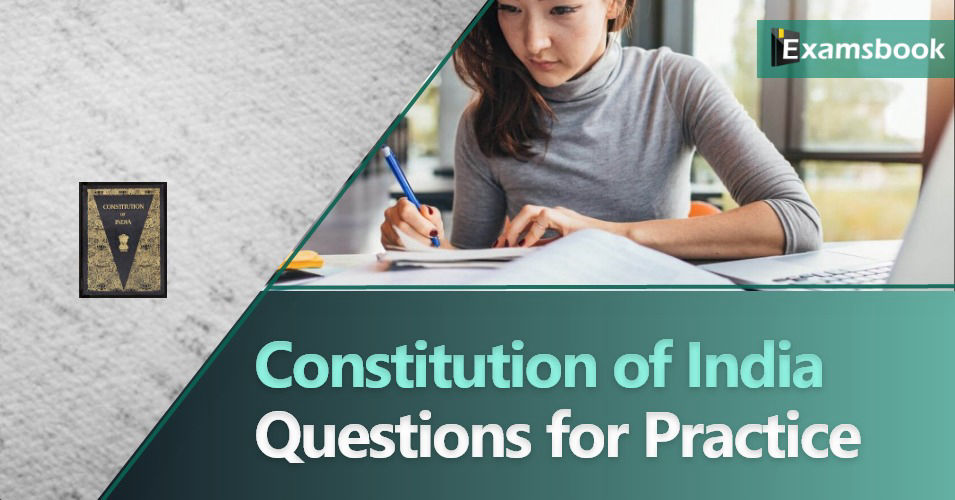Constitution of India Questions for Practice

Who was the first President of India?
(A) Ramnath Kovind
(B) Sarvpalli Radhakrishnan
(C) A P J Abdul Kalam
(D) Rajendra Prasad
Correct Answer : D
Which of the following is not a constitutional provision related to Social justice?
(A) Reservation for SC and ST in Government jobs.
(B) Reservation for SC and ST in Legislature.
(C) Equal pay for equal work.
(D) Prohibition of Child Labour.
Correct Answer : C
Explanation :
Thus here Equal pay for equal work is not a constitutional provision related to Social Justice. Following are the Political Safeguards related to Social Justice: Article 330: Reservation of seats for Scheduled Castes and Scheduled Tribes in the House of the People.
According to the Constitution, India is best described as a________.
(A) Union of States
(B) Unitary State
(C) Sovereign state
(D) Federation
Correct Answer : A
Explanation :
India, also known as Bharat, is a Union of States. It is a Sovereign Socialist Secular Democratic Republic with a parliamentary system of government.
Under which Article the Fundamental Duties are enshrined under the Indian Constitution?
(A) Article 51A
(B) Article 52
(C) Article 51
(D) Article 50
Correct Answer : A
Explanation :
The Fundamental Duties are dealt with in Article 51A under Part-IV A of the Indian Constitution.
Under which act was the first federal government established in India?
(A) Government of India Act 1947
(B) Government of India Act 1942
(C) Government of India Act 1935
(D) None of these
Correct Answer : C
Under Article 352 the President of India cannot declare a national emergency in the whole country or in any part of the country?
(A) war
(B) external attack
(C) armed rebellion
(D) inner turmoil
Correct Answer : C
Who among the following has the power to form a new state within the Union of India?
(A) Supreme Court
(B) Speaker of Lok Sabha
(C) Prime Minister
(D) None of them
Correct Answer : D
Who appoints the State Election Commissioner?
(A) Chief Election Commissioner of India
(B) President of India
(C) Governor of the concerned State
(D) The Legislative Assembly of the State
Correct Answer : C
Explanation :
State election commissioner is appointed by President. To ensure the autonomy of the position the state election commissioner cannot be removed from office except on the grounds and manner specified for judge of High Court.
Which of the following statements regarding the Supreme Court of India is not correct?
(A) The President of India can seek the advice of Supreme Court in the matters related to interpretation of the Constitution.
(B) It is binding upon the Supreme Court to advise the President.
(C) The President is not bound to accept the advice given by the Supreme Court.
(D) The Government can make the necessary amendments in the proposed legislation on the advice of the Supreme Court.
Correct Answer : B
Electoral College for the election of the President of India consists of
(A) only the elected members of Lok Sabha
(B) all members of Lok Sabha
(C) only the elected members of the Parliament of India and the Legislative Assemblies of the States.
(D) only the elected members of the Parliament of India and the Legislative Assemblies of the States and Union Territories of Delhi and Puducherry.
Correct Answer : D



